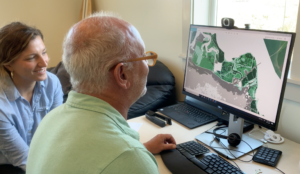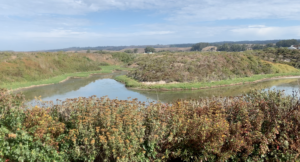Prop 68 Climate Resilience Miniseries Episode 2: Quantifying the Social and Economic Benefits of Nature-Based Adaptation Solutions
(Intro to the series here)
“We’re getting input from flood managers and stakeholders in the region…that’s exciting because it makes me feel that people will make decisions based off what we’re finding from this project” – Rae Taylor Burns
Today we visited University of California, Santa Cruz’s Coastal Science Campus to talk with Professor. Michael W. Beck, Co-PI on this Prop 68 project and Rae Taylor Burns, a PhD Student helping run the models for this effort aimed at measuring the social and economic benefits of nature-based adaptation solutions to protect San Mateo County from storms and sea-level rise. The primary goal of this project is to assess flood risk in San Francisco Bay and to identify the role of nature-based solutions in reducing those risks.

The project uses complex computational models for the SF Bay to evaluate current and future flood risk. By modeling increases in sea-levels and storms, the team can assess the consequences of increased flooding to people and property, but also assess how ‘restored’ wetland habitats adjacent to development in low-lying areas can reduce flooding risk. Similar models are used to assess how management choices and other adaptation solutions can mitigate other climate impacts, such as wildfires, drought, and extreme heat.
This team, led by Dr. Borja Reguero at UC Santa Cruz, will determine how effective nature-based solutions such as wetland restoration are at reducing the social and economic costs of flooding. “We need to adapt to sea level rise and storms, it is not a question of if, but when it will occur, we need to act now,” notes Dr. Reguero. Wetlands in the SF Bay shoreline represent a nature-based solution to the increasing challenges posed by climate change. The project will assess where and how nature-based solutions can protect San Mateo’s coastline, the interactions with the levee system, and revised ways to finance nature-based adaptation. When discussing the outcomes of this work, Beck notes that “it’s important to know that nature-based solutions are going to be just one part of the range of solutions for reducing [flooding] risks.”

The model will be developed using economic and social data from San Mateo County, which is“…a good place to look at flood risk because out of all the counties in California, it has one of the highest flood risks”, says Rae Taylor Burns. Much of the development in the greater Bay Area has been built on historical wetlands and is thus highly vulnerable to flood risk. “The innovation that San Mateo and San Francisco Bay are showing in terms of new ways to work with nature to address coastal hazards is important because it can also lead the way in other regions” adds Dr. Reguero. The project area includes development with high economic value (e.g. Facebook headquarters); but will also identify ways to protect socially vulnerable communities within the County. “California’s coastal flood risks are growing rapidly and that’s a combination of climate change, local development choices, shoreline change, and habitat loss. We are putting a lot of people and property at risk” says Dr. Beck.
The project will also build close collaboration with insurers, risk modelers, The Nature Conservancy and the CA Department of Insurance to assess financial incentives and tools to insure nature and fund proactive adaptation. “The outputs of the flood and economic modeling will ultimately be used to assess pathways for implementing and financing nature-based adaptation” says Dr. Reguero. The hope is to scale up this project to other coastal zones so that socio-economic models can inform policy for climate resilience and adaptation.
To learn more about this project, check out this video!
About Dr. Borja Reguero: Borja is the Lead PI on this project. Reguero is a coastal engineer who works on coastal hazards, their socioeconomic impacts and adaptation solutions. Borja is an Associate Researcher in the Institute of Marine Sciences at UC Santa Cruz and an Associate Adjunct Professor in UCSC’s Coastal Science and Policy Program. He also serves as a research fellow with the Natural Capital Project at Stanford University. Borja was awarded a 2020 Early-Career Research Fellowship by the Gulf Research Program of the National Academies of Sciences, Engineering, and Medicine.
About Dr. Michael W. Beck: Mike is the AXA Chair in Coastal Resilience at UC Santa Cruz–the first U.S. academic to be named as Chair. He is also the Co-PI on this Prop 68 project. Beck is a Research Professor in the Institute of Marine Sciences and an adjunct Professor in the Department of Ocean Sciences and the Coastal Science and Policy Program. Mike leads the Coastal Resilience Lab at UCSC.
About Rae Taylor Burns: Rae is a 4th year PhD Student in the Department of Ocean Sciences at UC Santa Cruz who is in a cooperative agreement with the U.S. Geological Survey. Rae was also funded by California Sea Grant to complete some of her dissertation research on climate resilience.
About the Author: Dr. Kathryn Beheshti is a 2021 California Sea Grant State Fellow with the Ocean Protection Council’s Climate Change Program. Kat’s own research focuses on understanding the drivers of loss and recovery of key coastal foundation species (e.g. salt marsh plants and seagrasses). Kat is committed to making science accessible to individuals of all ages and demographics. She hosts her own science communication platform, sloughit.com and participates in an interdisciplinary science communication team at SciAll.org, where she is a Lead Vlogger.

